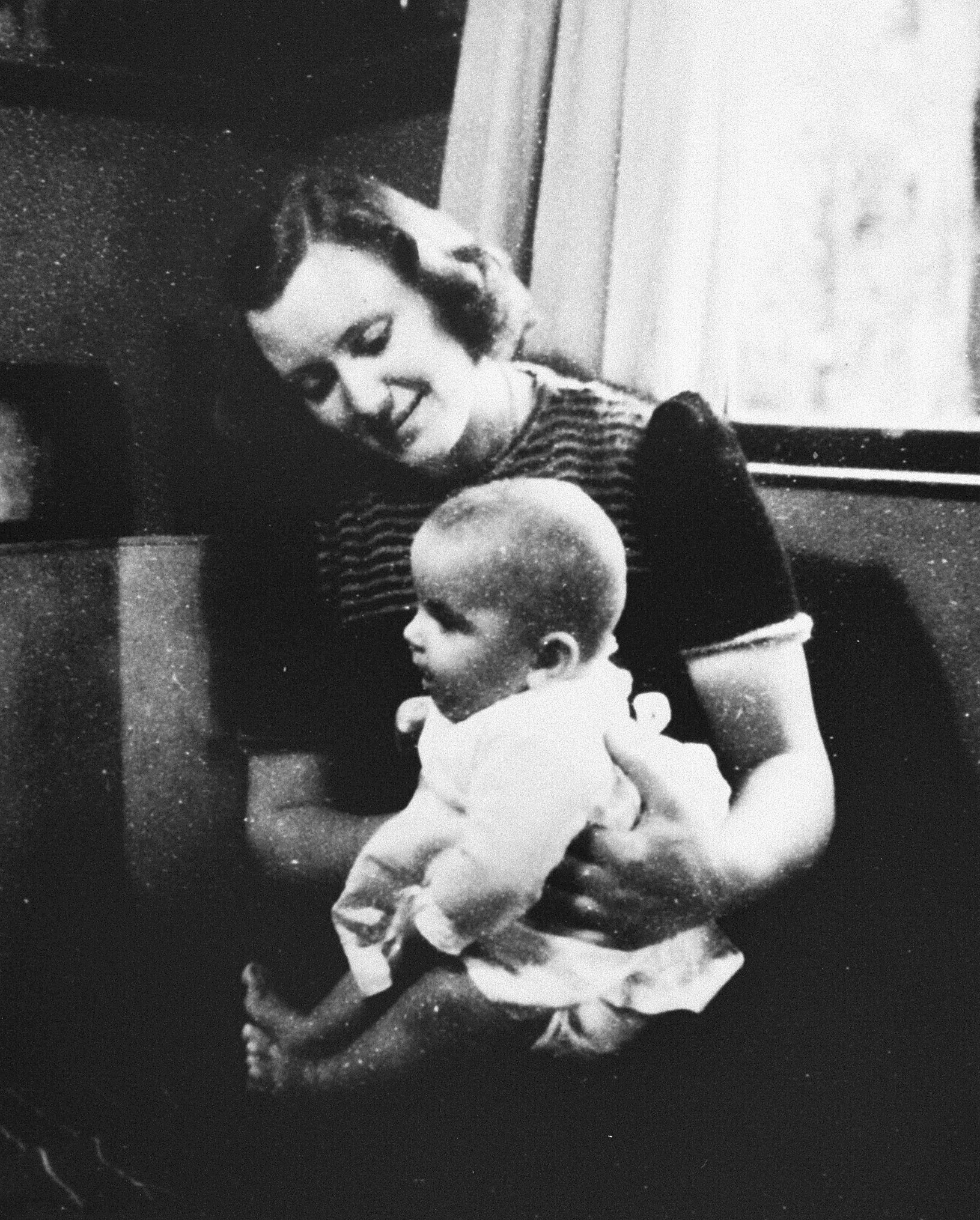Marian Pritchard with Erica Polak, a Jewish baby she was hiding in 1944. Part of the Dutch resistance under Nazi occupation, Pritchard later told an audience at a 1996 lecture at University of Michigan: “By 1945, I had lied, stolen, cheated, deceived and even killed.".” (photo from the US Holocaust Memorial Museum)
During my 13 years researching and writing An Address in Amsterdam, I often tried to imagine how I would have felt as a Gentile as the Nazis rounded up my Jewish neighbors— especially the children.
We know of at least one young woman, Marian Pritchard, who just couldn’t bear it when she saw Nazis storming a home for Jewish children and tossing them into trucks. Although she was only 19, Pritchard became a staunch resistance worker who kidnapped, stole, lied, deceived and even killed by the end of the war, protecting 150 Jewish lives in the process.
Far more people looked away from the roundups, or walked past the groups being marched through the city, or wished the war was over already. Their indifference and collusion were a factor in the mass murder of 80% of Amsterdam’s Jewish population of 75,000.
Now, when I see stories about the children we are incarcerating at the border, I understand the position of the Dutch in 1940-45 so much better. Something terrible is happening in my country, and I have a share of responsibility for it – more than the Dutch did, because they were occupied by a foreign power. In this case, my money is paying for it. My elected officials are allowing inhumane policies unless they are out front and center opposing and organizing against it. How should I respond when I see photographs of young kids sleeping under mylar blankets and nothing else? “Basic child welfare standards do not apply,” according to the Huffington Post.
I have read that no one is allowed to touch or comfort them. Hundreds have been separated from everyone they love, and many have little hope of reunification. Toddlers are taken into court hearings with representation that is a complete charade. In fact, 12,800 children were in custody in September 2018. Two have actually died under our roof, 8-year-old Felipe Gómez Alonzo and 7-year-old Jakelin Caal Maquin.
The prison (called a “tent city”) in Tornillo, Texas has been releasing some children for the last few weeks, and is slated to close— but this is no guarantee that the situation is better. According to WLRN in Miami, “With the recent releases of children, migrant advocates are cautiously hopeful. But they question why more of the 12,400 children who remain in the HHS shelter system have not been released. And they wonder why the government is closing Tornillo, but expanding another unlicensed emergency shelter in South Florida?”
Immigrant children now housed in a tent encampment under the new “zero tolerance” policy by the Trump administration are shown walking in single file at the facility near the Mexican border in Tornillo, Texas, U.S. June 19, 2018. REUTERS/Mike Blake
It’s so easy to feel sickened by all this and turn away, to agree with those who say “It’s just too depressing” or “I can’t stand it, so I try not to think about it.” Those are understandable reactions. But they don’t help the kids. How can we take personal responsibility to stop the cruelty we are engaging in as a nation?
Maintain the pressure on our Senators and Representatives. Praise those who are taking action, such as California Rep. Ted Lieu (D), and those who are starting investigations in the House of Representatives. If your Congresspeople are not among those who are leading the charge, goad them until they do, or ensure that they are hearing the full range of their constituents’ views.
Write or speak directly to those who perpetrate these crimes against humanity – the President, Homeland Security Secretary Kirstjen Nielsen, and Commissioner of U.S. Customs and Border Protection Kevin K. McAleenan. Write them, but also call their staffs. These people are paid to listen to you – except right now they aren’t, because of the government shut down. They’ll be back one day.
Get together with others to take creative action to protest and resist. Link up with the peace and justice organizations in your community to see what’s possible as a group. Depending on where you are, children and adults are being held in multiple locations. Just as in Amsterdam under the Nazis, the invisibility of these prisons makes it possible for the outrages to continue.
People protest against U.S. immigration policies on the American side, right, of the Mexico-America border near Tijuana on Dec. 10, 2018. RNS photo by Jair Cabrera Torres
Support the organizations which are providing humanitarian and legal aid to these persecuted people, both adults and children. No one will help them but you and me. Many groups are worthy, but for whatever it’s worth these are my choices:
Keep the stories alive. Pass them along. Don’t let these children be forgotten – or their parents. Talk about them at home and in your places of worship, write and post about them on your social media. Tell your kids and grandkids what is going on. Get them involved in trying to communicate why their country shouldn’t treat anybody this way, much less another child. If we involve children now, maybe we can face them when they grow up.
—Mary Dingee Fillmore, author of An Address in Amsterdam



